Coordinación
Una coordinación sólida puede evitar vacíos y duplicaciones en las respuestas humanitarias, así como garantizar que los PTM complementen otros tipos de asistencia. Sin embargo, el informe del «Estado Global de los Programas de Transferencias Monetarias» de la CALP Network muestra que la coordinación de la asistencia en efectivo es vista como débil y ad hoc, y que esto está teniendo graves repercusiones operativas.
Los donantes, las ONG y los líderes de los grupos de trabajo de transferencias monetarias (GTM) han pedido claridad sobre tres temas principales relacionados con la coordinación de la asistencia en efectivo:
- Quién debe ser responsable de asegurar una coordinación eficaz de la asistencia en efectivo;
- Cuál es la función y el mandato de los grupos de trabajo de transferencias monetarias, incluso en relación con las transferencias monetarias multipropósito;
- Cómo se debe dotar de recursos a la coordinación de asistencia en efectivo.
Tenemos que basarnos urgentemente en lo que funciona y proporcionar claridad a nivel mundial sobre las preguntas arriba mencionadas, adaptándonos a los diferentes contextos. Hace mucho tiempo que se deberían haber tomado decisiones claras basadas en necesidades operativas y no en la política de las agencias.
Prioridades actuales
El objetivo de la CALP Network es contribuir a seguir progresando en este tema en tres niveles: apoyar a los grupos de trabajo de transferencias monetarias a nivel regional; contribuir a soluciones prácticas para la coordinación de la asistencia en efectivo a nivel mundial; y convocar una discusión basada en la evidencia sobre temas clave, destacando puntos de decisión críticos y oportunidades de progreso.
Contenido destacado

Cash Coordination Tip Sheet
Guidelines and Tools
This tip sheet sets out established best practice, key guidance and resources for all aspects of cash coordination, intended as a clear, accessible and action-oriented guide for those engaged in coordination of cash and voucher assistance (CVA) at the field level.

Introducing the Cash Coordination Tip Sheet
Webinar
The CALP Network has developed a tipsheet setting out established best practice and key guidance and resources for all aspects of cash coordination, intended as a clear, accessible and action-oriented guide for those engaged in coordination of cash and voucher assistance at the field level.

Cash Coordination: A proposal from members in MENA
Blog Post
Earlier this year the CALP Network undertook regional consultations to explore options for cash coordination. This blog lays out recommendations from participants from the Middle East and North Africa who sketched out what cash coordination, and coordination more broadly, could look like in future to support a more effective, efficient and accountable response.
Últimos recursos

Enacting urban cash for work programmes in Lebanon in response to the Syrian refugee crisis
Guidelines and Tools
Humanitarian crises in cities require responses that reflect the urban context,address urban challenges, and provide urbanised solutions. This paper focuses on providing guidance on good practice in cash for work (CfW) programmes. Focusing on Lebanon and the Syrian refugee crisis, the paper provides nine...
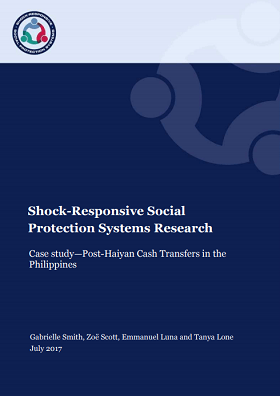
Shock-Responsive Social Protection Systems Research Case study—Post-Haiyan Cash Transfers in the Philippines
Report
This case study report focuses specifically on the experiences of using emergency cash transfers following Typhoon Haiyan and considers the wider social protection system, developments since Haiyan and future possibilities for shock-responsive social protection. A summary briefing note is published...
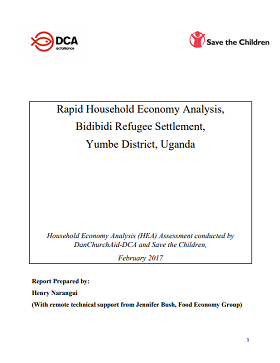
Rapid Household Economy Analysis,Bidibidi Refugee Settlement,Yumbe District, Uganda
Report
Yumbe District (Bidibidi settlement) hosts about 272,2061 refugees from South Sudan. An influx of refugees to Bidibidi settlement, Yumbe District, took place starting from August 2016 due to the increased conflict, scarcity of food, and subsequent financial instability caused by hyperinflation in South...

Can Conditional Cash Transfers improve the uptake of nutrition interventions and household food security? Evidence from Odisha’s Mamata scheme
Report
There is considerable global evidence on the effectiveness of cash transfers in improving health and nutrition outcomes; however, the evidence from South Asia, particularly India, is limited. In the context of India where more than a third of children are undernourished, and where there is considerable...
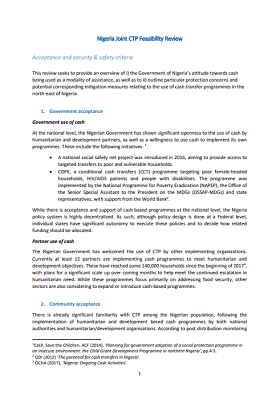
Nigeria Acceptance And Safety Assessment
Guidelines and Tools
This review seeks to provide an overview of i) the Government of Nigeria’s attitude towards cash being used as a modality of assistance, as well as to ii) outline particular protection concerns and potential corresponding mitigation measures relating to the use of cash transfer programmes in the

Interim Guidance Note on Determining Cash Transfers Values for Food Security
Guidelines and Tools
The objective of this guidance note, as laid out in the Terms of Reference, is to: Leverage FSC partners’ knowledge and experience to develop guidance on cash transfer value logic for both unconditional and relevant food security cash for work/assets3 programming. It focusses on acute food insecurity...

Responding to Drought in Kenya Using Cash and Vouchers: Learning from Previous Responses
Report
This paper provides a summary of 100 recommendations, lessons and observations from evaluations that have looked at the use of cash and vouchers in drought responses in Kenya. The reports which were reviewed considered the use of cash and vouchers in drought related responses in urban and rural areas;...

Multi-sector Market Assessment: Companion Guide and Toolkit
Guidelines and Tools
The Multi-sector Market Assessment: Companion Guide and Toolkit provides step-by-step guidance and ready-to-use tools to enable non-specialist staff to conduct market assessments and undertake market monitoring. The purpose of this Companion Guide and Toolkit is to enable Multi-Functional Teams to...

Feasibility of Multi-purpose Cash Transfers in N’Guigmi
Report
This assessment was conducted by World Vision’s Emergency Program in the Lake Chad Basin. The objective was to: 1) Do a comprehensive needs assessment of the affected populations in the area, 2) Specify the amount of the minimum expenditure basket 3) Evaluate the market capacity and feasibility of...

Building on social protection systems for effective disaster response: the Pakistan experience
Report
How can social protection systems be used in disasters, as a complement to, or substitute for, humanitarian assistance? Oxford Policy Management (OPM) led a two-year research project investigating this question, looking at the role of social protection in both mitigating the impact of large-scale shocks...
The effect of financial aid from UK Aid Girls’ Education South Sudan programme and EU IMPACT programme to education in South Sudan in 2017
Report
This paper is an update to the previous Girls’ Education South Sudan working paper that looked at the effect of financial interventions (capitation grants and girl’s cash transfers) by Girls’ Education South Sudan, a collaboration of UK Aid and the Ministry of General Education and Instruction,...
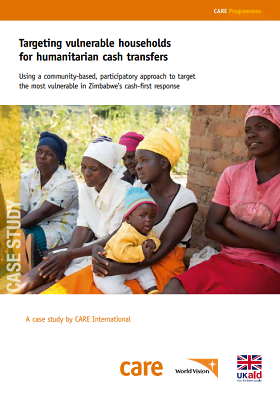
Targeting vulnerable households for humanitarian cash transfers: using a community based, participatory approach to target the most vulnerable in Zimbabwe’s cash-first response
Report
Over 73,000 drought affected households across 15 districts in Zimbabwe received monthly multi-purpose, unconditional cash transfers. With such a large caseload over a wide area, 100% verification of the households would not have been the most resource efficient approach. Moreover, there would have been a...

E-transfers Procurement Learning and Good Practices
Guidelines and Tools
Humanitarian agencies have increased their use of cash transfers and related distribution technologies. Yet, most rely largerly procurement and contracting processes designed for goods and professional services. An Elan Survey of humanitarian operations staff and e-transfers providers indicated several...

Tracking Expenditure on Cash Transfer Programming
Guidelines and Tools
The need for reliable and comparable data on Cash Transfer Programmes (CTPs), collected systematically and based on standardized markers and definitions, is widely recognised. Improved CTP tracking and reporting is essential for monitoring progress towards the commitments made to strengthen the scale and...
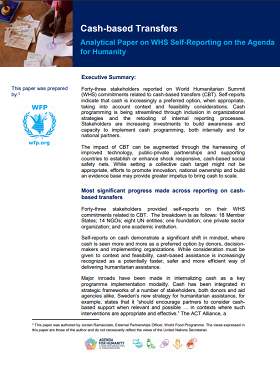
Cash-based transfers. Analytical Paper on WHS Self-Reporting on the Agenda for Humanity
Report
Forty-three stakeholders reported on World Humanitarian Summit (WHS) commitments related to cash-based transfers (CBT). Self-reports indicate that cash is increasingly a preferred option, when appropriate, taking into account context and feasibility considerations. Cash programming is being streamlined...
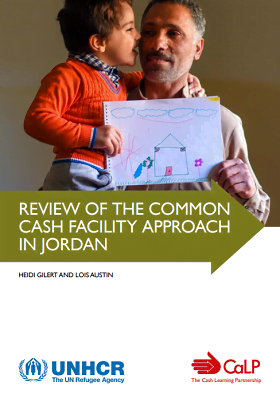
Review of the Common Cash Facility approach in Jordan
Report
The United Nations High Commissioner for Refugees (UNHCR) in Jordan has pioneered a collaborative, multi-stakeholder approach to the delivery of cash, known as the Common Cash Facility (CCF). The aim of the CCF is to provide humanitarian actors with direct and equal access to a common financial service...
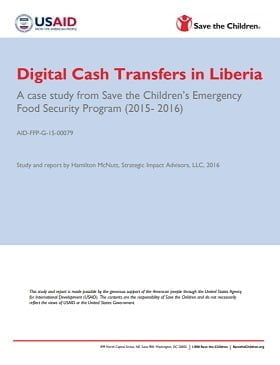
Digital Cash Transfers in Liberia. A case study from Save the Children’s Emergency Food Security Program (2015- 2016)
Report
Through its USAID-funded Emergency Food Security Program, Save the Children was the first organization to implement cash transfers through mobile money at scale in Liberia, where mobile money services are nascent. From liquidity management to incentivizing agents, the challenges, lessons, and...

The Role of Financial Services in Humanitarian Crises
Guidelines and Tools
More than 75 percent of adults who live in countries that are coping with humanitarian crises remain outside the formal financial system. Financial inclusion would provide both refugees and residents with a diversified set of financial products (including savings, remittances, credit, and insurance) that...

Monitoring 4 CTP: Monitoring Guidance for CTP in Emergencies
Guidelines and Tools
This guidance provides a central resource to promote a common understanding of the most important monitoring considerations for humanitarian projects using cash transfer programming (CTP). The primary audience for this guidance is field-level practitioners, from organisations directly involved in the...

Profiling of caseload in need of cash-based interventions Results
Report
At the request of the Inter Sector Working Group in Gaziantep, the Case Management Task Force and the Protection Working Group, the Cash-Based Interventions Technical Working Group (CBI TWG) produced this “Cash Gap Analysis”. The analysis aimed to profile the refugee population in Turkey who require...